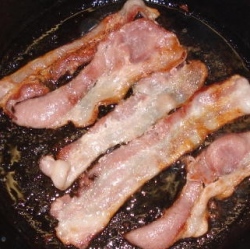
Harvard Medical School researchers have concluded that a diet high in red meat can shorten life expectancy.
They studied the diets and health of more than 120,000 people over the course of more than 20 years and found that red meat is associated with an increased risk of fatal heart disease and terminal cancer.
Over the study period, an extra portion of unprocessed red meat was associated with an overall 13% increased risk of death annually (and the figure for processed meat was even higher).
But what does this mean?
The easiest way to understand it is to think of how this might affect two friends who live very similar lives, according to David Spiegelhalter, a Cambridge University biostatistician, and the Winton Professor of the Public Understanding of Risk.
Imagine that the two friends are men aged 40, who are the same weight, do the same amount of exercise and do the same job.
The only difference between them is that one eats an extra portion of red meat every day – an extra 85g, or 3oz.
"Let’s say that every work lunchtime one of them had a hamburger and the other didn’t.
"What the study found is that the one who likes the meat had a 13% extra risk of dying. They’re both going to die in the end, but one has got this extra annual risk of dying."
But what does that extra risk amount to in practice – for these two average people? The paper doesn’t say.
Spiegelhalter has been working it out.
"The person who eats more meat is expected to live one year less than the person who doesn’t eat so much meat. You’d expect the 40-year-old who does eat the extra meat to live, on average, another 39 years, up to age 79, and the person who doesn’t eat so much meat, you’d expect him to live until age 80."
